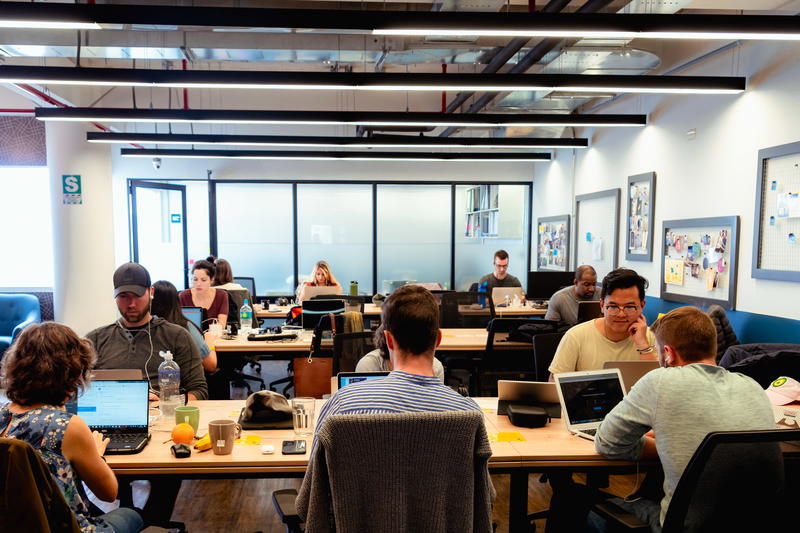How to Transition from Freelancing to Full-Time Job (10 Tips)

Going back to the 9-to-5 after freelancing full-time is hard, which is why we’re sharing tips for going from freelance back to full-time, and returning to full-time work after ending a freelancing career.
This article may contain affiliate links. We earn a small commission when you purchase via those links — at no extra cost to you. It's only us (Becca & Dan) working on this website, so we value your support! Read our privacy policy and learn more about us.
Table of contents
- Use your recent freelance skills to your advantage
- Be patient while transitioning from freelance to full-time positions
- Have a prepared reason for why you’re a freelancer looking for full-time work
- Remember that as a freelancer, you own/owned a business
- Be prepared to focus on one particular skill set for a full-time role
- Network with people who are working for companies full-time
- Don’t abandon all of your freelance clients and connections
- Stay involved in freelancer communities
- Prove that you’re a leader
- Determine if going full-time is the right career move for you
The freelance lifestyle isn’t for everyone. Becca and I have toggled back and forth between working full-time as freelancers and working full-time. We’ve even freelanced while working full-time!
For times when we’ve had to apply to full-time jobs after long stints of freelancing, we’ve come across a few struggles throughout the process. I’d like to share some of our findings and how you can get a full-time job after being a freelancer.
Let’s begin!

Check out our guide on the pros and cons of freelancing if you want to get a better idea about your options!
Use your recent freelance skills to your advantage
As a freelancer, you are a project manager, an accountant, a business analyst, an expert in communication and so many other things. Because you run your own business, you’ve learned a lot of skills that a lot of other full-time employees don’t have, whether you know it or not.
As you’re looking for a full-time job, don’t be afraid of the job descriptions. You’ve had to learn a lot of the skills that you use to run your freelance business. You can prove that you’re a fast learner and that you are able to perform successfully in many unique business environments.
There are a number of companies out there that thrive on flexible and agile team members. Startups, for example, provide excellent transition roles for a freelancer. Working for a startup means that you need to pivot and learn new skills. You’ll likely have to take on new responsibilities and set aside something else to reach new goals.
Small companies and agencies thrive off flexible team members as well. For example, I’ve freelanced and worked full-time at agencies in the past. I was a valuable asset to them because I was able to help with a lot of different tasks.
Specifically, I could help develop emails, design and build landing pages or help set up client emails. In a bigger company, you’d have to reach across multiple departments to get this work done. For a small company, I was able to help with everything.
Be patient while transitioning from freelance to full-time positions
The fact is that some hiring managers are looking for a specific type of candidate. They are looking for someone who has come from an “x” company with “y” experience. As freelancers often aren’t that cut-and-dry type of cookie-cutter person, it might create a unique scenario.
During an interview process, you’ll have a lot to talk about! Make sure to discuss that your freelancing is not an employment gap. If you did take some sort of sabbatical or gap year, be sure to mention in an interview how you learned new professional skills or took time to configure your career pivot.
You can bring up how you’ve helped a company reach a certain milestone. You can discuss how you automated a system for queueing feedback. If you’re able to prove a sense of accomplishment, then you will impress any interviewer.
If you’re struggling with hearing back after your resume is submitted, take the following into consideration.
There’s a right company for you, it takes time and a little research to find a company that is looking for your unique set of skills and qualifications.
The job interview process is a two-way street. If you’re not getting positive feedback from the right types of jobs, it might be that you’re not applying for the right type of positions.
Consider changing your strategy and applying to a different set of companies. We list some of the best work from home sites, and many of them are for a diverse array of skill sets.
You can try updating your resume to prove expertise in a specific area. You can show growth metrics from companies that you’ve helped. You can add new certifications that you were able to obtain while you were freelancing.
Have different versions of your resume that you’re able to piece together if nothing is working. Using something like read.cv can make it easy to update your resume on-the-fly.
You’ll eventually find the winning combination based on what resonates with other people. Keep a keen eye on those findings and incorporate them into your approach.

Have a prepared reason for why you’re a freelancer looking for full-time work
It will likely come up multiple times: “So, why did you decide to look for a full-time job?”
Your answer will be a personal one, but should show confidence in your decision. You don’t want to say, “I couldn’t find any clients,” or, “It was too hard.”
It’s better to say something like, “I’m looking for my next challenge,” or, “I want to apply my abilities to a bigger cause.”
We recommend having a default crafted response ready to go so that you don’t hesitate when you get asked this question!
Typically, you won’t hear anything else. When people ask, they’re genuinely interested in why you’re making a career shift.

Remember that as a freelancer, you own/owned a business
It’s easy to get into a routine and forget that as a freelancer, you currently own a business! You could even say you’re a CEO — fancy!
A lot of pride should come from being able to start a business and run it on your terms.
But when working for someone else, you’re leaving a small amount of that freedom on the table. Be able to respect other people’s wishes and learn the new company culture.

Be prepared to focus on one particular skill set for a full-time role
After working in a freelance capacity, it’s no secret that you’ve picked up a number of new and exciting skills. It’s not like you’re not grateful for those skills and experiences, but they’re sometimes not completely necessary in being able to be effective in your new job.
For example, when I was freelancing, I got good at streamlining proposals and keeping project scopes realistic to a budget. In my full-time role, I’m currently not working with any clients. I don’t see proposals and I don’t deal with budgets. That’s life!
However, I can use the themes of those unneeded skills to my advantage. Instead of being able to hold a client accountable for changes being in scope, I can set better expectations for my coworkers and team members.
No matter which type of job you’re starting, or applying for, focus on doing the best possible job that you can, in that specific area of concentration.

Network with people who are working for companies full-time
If you’re finding it difficult to hear back from companies that you’re applying to, network with people who work for companies that you’d like to work for. Sometimes all it takes is one positive referral to bypass into the next level of interview processes.
Even if you’re not transitioning from freelance back to full-time, first-hand referrals are some of the best ways to find a new job.
You can even reach out to some of your existing freelance clients and tell them that you are interested in working full-time somewhere.
While I was freelancing for an agency in New York City, I was approached by a recruiter to tell me that she was hiring for full-time positions. If I had been looking for that opportunity, it would have been perfect!
Don’t abandon all of your freelance clients and connections
In the same way you’d leave a full-time job, you should leave a long-term freelance relationship gracefully and respectfully. It’s common courtesy to give ample time for your notice. This way, if you hold a lot of knowledge, you can spend the time to train someone else, or leave breadcrumbs with the work that you’ve been doing.
Make sure to respect your contract end date. The fact that you received a full-time offer elsewhere doesn’t mean you can bail on your contract. You can explore options in finishing your contract after-hours, or possibly subcontracting the rest of the work out to another freelancer with the same skills.
Look at your contracts and make sure that you don’t have any non-compete clauses with companies with which you’re looking for full-time employment. If this is the case, you might need to have a specific buffer time frame with your employment. This can be the case for some finance jobs.
You want to keep a good professional relationship with everyone with whom you’ve worked in the past. You never know — you may have a previous freelance client who works at a company where you’re applying!

Stay involved in freelancer communities
It’s a good idea to stay connected with various freelancers and freelance resources while you’re working full-time. You have so much knowledge about freelancing, and maybe you can help other people with your learned skills.
It’s also a great way to stay connected with other freelancers if you see that they are looking for new employment options. You might be able to hire some of your freelance connections for the job you recently started at.
If you have additional capacity to pick up some freelance work, staying in these communities can help open new doors to projects that match up with your availability.
Looking for more remote jobs, either full-time or gig-based? Check out our list of remote job boards for many types of professionals.

Prove that you’re a leader
A lack of leadership and not working well with others have been red flags that I’ve heard about when transitioning to a full-time position. It’s important to be able to communicate your leadership skills, while working for yourself.
Leadership can come in the form of project ownership, time management and being able to distribute work effectively. Leadership doesn’t necessarily mean managing people. Think back on your past projects and experiences, and see if any of those traits match with what you’ve done.
If your freelance role doesn’t match any leadership styles, no problem! I wouldn’t say that this is a must-have trait that is necessary with the full-time territory. It’s something that you can self-identify with and work on in the future.
Determine if going full-time is the right career move for you
Lastly, I want to end this article with determining if working as a full-time employee is right for you.
We talk at length about if working full-time is better than working part-time or contracting, and the truth is that maybe it is (for you).
Think back on the reasons that made you want to work as a freelancer in the first place. Was it to have more time with family? Was it to be able to work remotely? Was it to have flexible hours? Something else?
And, are those reasons still the same?
In your full-time search, see if the reasons why you worked as a freelancer align with your reasons for working as a full-time employee. This is for you to figure out, as different types of work setups have all different sorts of significance and benefits for various types of people.
Whatever you decide, go for it!
💼 Growing your freelance career?
These freelancing playbooks come straight from our wins and misses. If our advice unlocked a new client or idea, a coffee helps us share more real stories.
Support our freelance resourcesYou may also like
-
![A woman working at a desk in a small room.]()
How Many Hours Is Considered Part-time? Is Full-time Better?
What are the pros and cons of working part-time, and what are the benefits of working part-time vs. full-time? Find out here, as we discuss if employers prefer full-time or part-time employees.
-
![A laptop computer on a table with a cup of coffee.]()
14 Pros and Cons of Freelancing Vs. Working Full-Time
What are the pros and cons of freelancing? Are there advantages and disadvantages of freelancing? See the benefits of freelancing, and differences between being freelance vs. an employee.
-
![A man sitting at a table with a laptop.]()
How to Transition from Full-time to Freelance (17 Actionable Tips)
Looking for how to transition from working full-time to freelancing? See our best 17 tips for how to start freelancing from scratch, secure freelance clients and when to go full-time freelance.
-
![A woman working on a laptop in a conference room.]()
What to Do in between Freelance Projects (19 Ideas)
What should you do with downtime, as a freelancer? Here are the 19 best ways to make the most of downtime when you’re in between freelance projects in order to stay productive when waiting for your next freelance job.
-
![a chair and a table in a room]()
How to Explain Freelance Employment Gaps in an Interview
How do you explain an employment gap as a freelancer? To justify a freelance employment gap in an interview, use these examples and tips to explain any gap between full-time jobs.
-
![a wooden table with a laptop on it]()
How (And When) to Fire a Freelance Client
What’s the best most proven way to fire a freelance client? Use these examples with our “How to fire a client” sample letter and email template script.







